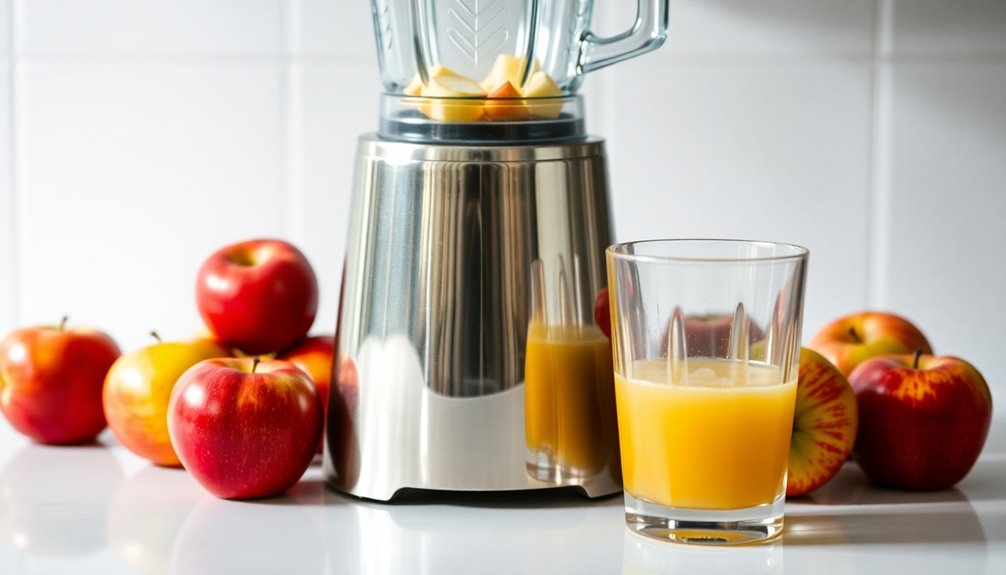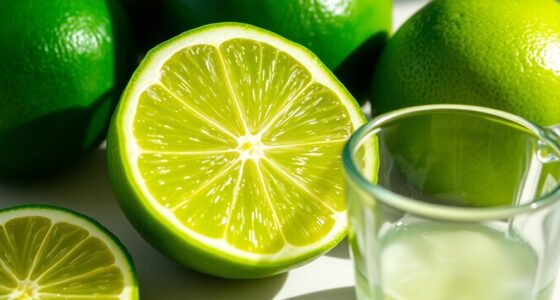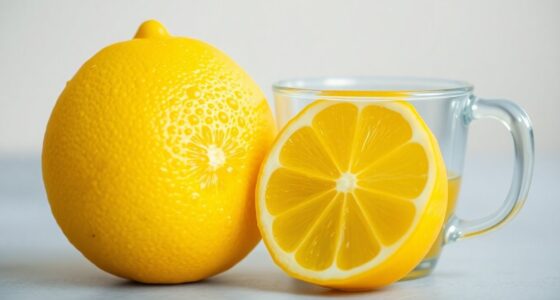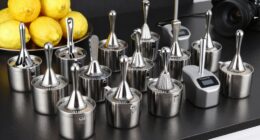To make apple juice in a blender, start by washing and chopping 2-3 organic apples, then blend them with 1/4 to 1/2 cup of water until smooth. Next, strain the mixture through a fine mesh sieve or cheesecloth to separate the juice from the pulp. Press down on the pulp for extra juice. Serve it fresh for the best flavor, and you can find out how to preserve the juice for longer if you continue on.
Key Takeaways
- Wash and chop 2-3 organic apples, discarding seeds and cores for better blending.
- Blend apple chunks with 1/4 to 1/2 cup of water until smooth.
- Use a fine mesh sieve, cheesecloth, or nut milk bag to strain the blended mixture.
- Press down on the pulp to extract maximum juice into a bowl or pitcher.
- Serve immediately for freshness or store in the refrigerator for 1-2 days.
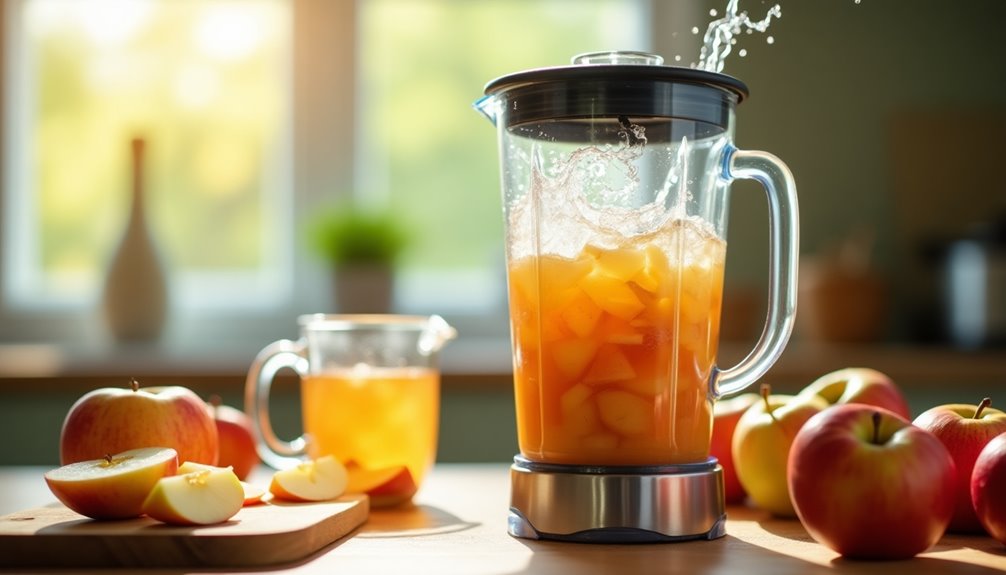
Making your own apple juice at home can be a simple and rewarding process. You'll love the taste of fresh apple juice, and it's a great way to enjoy the natural sweetness of apples. To get started, you'll need 2-3 organic apples, a blender, and a few simple tools. The process is straightforward, and you can customize it to suit your taste.
First, wash the apples thoroughly to remove any dirt or pesticides. If you prefer a less bitter flavor, you might want to peel them. However, keeping the skin on adds beneficial pectin, which is great for digestion. After washing, core the apples and chop them into small chunks, ensuring you discard any seeds. The smaller the apple chunks, the easier it'll be for your blender to process them.
Next, it's time to blend the apples. Place the chopped apple chunks into your blender and add about 1/4 to 1/2 cup of water. This addition helps achieve a smoother consistency and makes it easier to strain the blended mixture later. Blend the apples on high until you reach a smooth, liquid-like consistency. This should only take a minute or two, depending on your blender's power.
Once you've blended the apples, you'll have a thick mixture that contains both juice and pulp. Now comes the fun part—straining! To create a clearer juice, you'll need to strain the blended mixture. You can use a fine mesh sieve, a piece of cheesecloth, or a nut milk bag for this process.
Place your chosen strainer over a bowl or a large pitcher, then pour the blended apple mixture into it. Allow the juice to drain through, using a spoon to press down on the pulp if needed to extract as much juice as possible. The result will be a delicious batch of fresh apple juice, while the remaining pulp can be composted or used in baking.
Once you've strained the juice, it's best to serve it immediately for the best flavor and freshness. You'll find that homemade fresh apple juice is a refreshing drink that's perfect on a warm day or as a delightful addition to your breakfast. If you can't finish it all at once, you can store the juice in the refrigerator for 1-2 days, but be mindful that the nutrients and flavor are best enjoyed fresh.
In just a few simple steps, you've created your own homemade apple juice. It's a fantastic way to savor the flavor of organic apples and enjoy a nutritious beverage. Whether you're sipping it solo or sharing it with friends and family, this fresh apple juice is sure to impress everyone with its taste and quality. So grab those apples, and get blending!
Frequently Asked Questions
Can You Blend an Apple in a Blender?
Yes, you can definitely blend an apple in a blender! Just wash, core, and chop it into smaller pieces for easier blending.
Peeling is optional, but remember that the skin holds valuable nutrients. If you've got a powerful blender, it'll handle the apple well, even with the skin.
Adding a bit of water helps achieve a smoother consistency. After blending, strain the mixture to get rid of the pulp for a clearer juice.
Can You Make Juice With Just a Blender?
Yes, you can definitely make juice with just a blender! Start by choosing your favorite fruits or vegetables, and chop them into smaller pieces.
Add a little water to help with blending. Blend until smooth, then strain the mixture through a fine mesh sieve if you want a clearer juice.
This method retains more nutrients and gives you the option to customize flavors, so you can create your perfect juice right at home! Additionally, experimenting with various fruits and vegetables allows you to discover unique combinations that suit your taste preferences. For example, if you’re looking for a refreshing and nutritious drink, learning how to prepare blueberry juice can be a delightful addition to your repertoire. With just a few simple ingredients, you can whip up a vibrant and healthy beverage that is packed with antioxidants and flavor.
How Do You Crush Apples for Juice?
Did you know that over 7,500 varieties of apples exist worldwide?
To crush apples for juice, you'll want to start by washing and peeling them, if you prefer. Remove the core and seeds to avoid bitterness. Cut the apples into smaller chunks for easier blending.
Use a high-powered blender with a bit of water, blending until you get a smooth purée. Finally, strain the mixture to separate the juice from the pulp for refreshing apple juice.
How Many Apples Does It Take to Make 1 Quart of Apple Juice?
To make 1 quart of apple juice, you'll need about 12 to 16 medium-sized apples, depending on their juiciness.
Each apple typically yields around 1/4 to 1/3 cup of juice, so you'll require multiple apples to reach your goal.
Mixing sweet and tart varieties can enhance the flavor, and remember, firmer apples usually extract more juice compared to softer ones.
Your method can also affect the total yield, so keep that in mind!
Conclusion
So there you have it—making apple juice in a blender is just as easy as convincing a kid to eat candy! You've turned humble apples into liquid gold without the need for a fancy juicer or a degree in fruit engineering. You can now sip on your homemade juice, feeling like a culinary wizard, all while knowing that you just outsmarted the juice aisle at the grocery store. Who knew being a juice aficionado could be this simple? Cheers!
Cindy thoroughly researches juicing trends, techniques, and recipes to provide readers with practical advice and inspiration. Her writing style is accessible, engaging, and designed to make complex concepts easy to understand. Cindy’s dedication to promoting the advantages of juicing shines through her work, empowering readers to make positive changes in their lives through the simple act of juicing.

